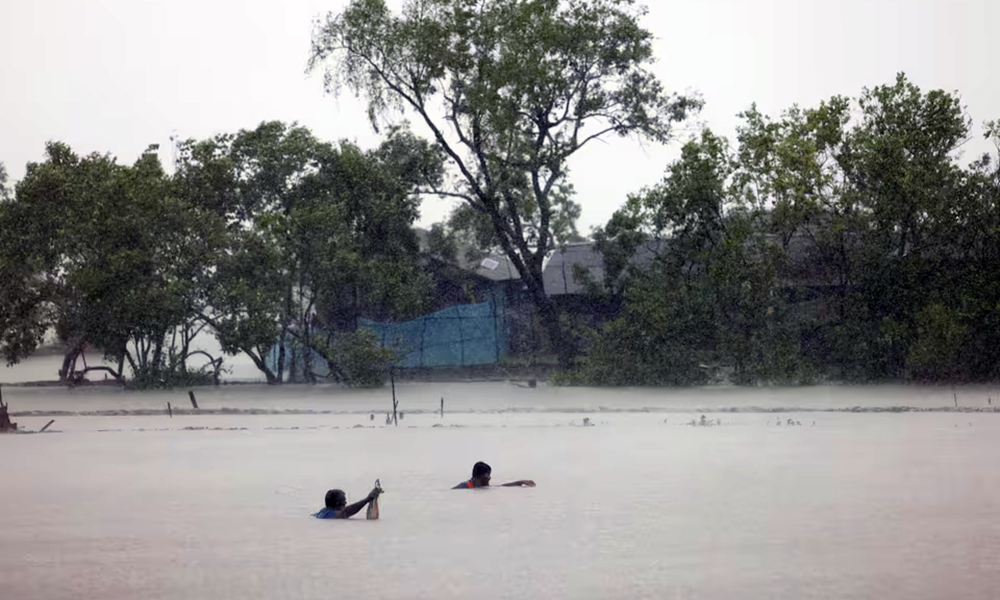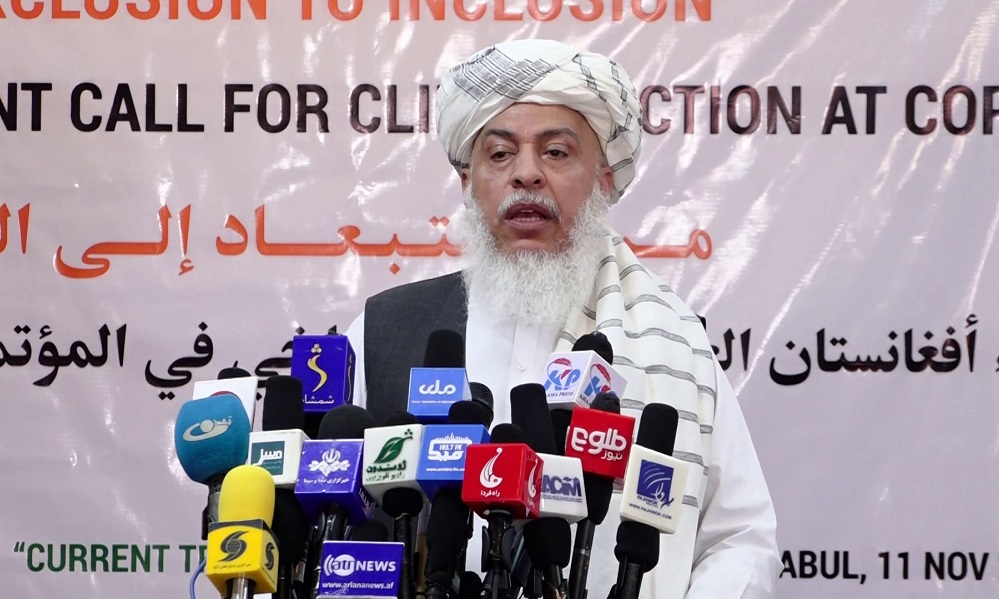Climate Change
Cyclone kills 16 in India, Bangladesh and cuts power to millions

Strong gales and heavy rain triggered by the first major cyclone of the year lashed the coastlines of India and Bangladesh on Monday, killing at least 16 people and cutting power to millions.
The winds had not stopped as night fell, with water rising in many places and overwhelming drainage systems, Bangladeshi climate expert Liakath Ali said.
"Many people are stranded - it will be another long night ahead with millions not having electricity or shelter," he said in a statement. "And people having no idea of how damaged their homes, land and livestock are."
Cyclone Remal is the first of the frequent storms expected to pound the low-lying coasts of the South Asian neighbors this year as climate change drives up surface temperatures at sea, Reuters reported.
Packing speeds of up to 135 kph, it crossed the area around Bangladesh's southern port of Mongla and the adjoining Sagar Islands in India's West Bengal late on Sunday, weather officials said, making landfall at about 9 p.m.
More than 8.4 million people, including 3.2 million children, are at high health, nutrition, sanitation and safety risk, said Sheldon Yett, UNICEF Representative to Bangladesh.
At least 10 people were killed in Bangladesh, disaster management chief Mijanur Rahman told Reuters, adding some victims died en route to shelters or when their homes or walls collapsed, or drowned during the storm.
"People are usually very reluctant to leave their livestock and homes to go to cyclone shelters," he said. "They wait until the last minute when it is often too late."
State Minister for Disaster Management and Relief Mohibbur Rahman said the cyclone destroyed nearly 35,000 homes across 19 districts. An additional 115,000 homes were partially damaged.
In India's West Bengal state, four people were electrocuted, authorities said, taking the death toll in the state to six.
Bangladesh shut down electricity supply to some areas in advance to avoid accidents, while in many coastal towns fallen trees and snapped electricity lines further disrupted supply, power ministry officials said.
Nearly 3 million people in Bangladesh were without electricity, officials added. West Bengal authorities said at least 1,200 power poles were uprooted, while 300 mud huts had been razed.
Flooded roads disrupted travel in the Bangladeshi capital of Dhaka. Rain also flooded many streets in the Indian city of Kolkata, with reports of wall collapses and at least 52 fallen trees.
Kolkata resumed flights after more than 50 were cancelled from Sunday. Suburban train services were also restored.
Both nations moved nearly a million people to storm shelters, about 800,000 in Bangladesh and roughly 110,000 in India, authorities said.
Climate Change
Pakistan’s Punjab shuts construction and schools, and lockdown looms to fight smog

Pakistan's Punjab declared a health emergency due to toxic smog on Friday, banning construction, shutting schools for another week and moving universities online, with a three-day lockdown possible, the province's senior minister said on Friday.
Punjab battles toxic smog every winter as cold air traps dust, emissions, and smoke from illegal stubble burning on fields. Air quality has deteriorated drastically in recent weeks and the province's capital Lahore currently ranks as the world's most polluted city, says IQAir.
"A complete lockdown will be enforced on Friday, Saturday, and Sunday (next week) if the situation does not improve by Wednesday," said Punjab Senior Minister Marriyum Aurangzeb, addressing a press conference in Lahore.
Citizens were advised to stay indoors. Air Quality Index (AQI) readings in Lahore reached 637 at 3 p.m. (1000 GMT), according to Swiss group IQAir, significantly higher than levels recommended by the World Health Organization.
The government had ordered the closure of construction, brick kilns, and furnace-based plants in Lahore and the city of Multan, the minister said.
Punjab's government had last week ordered schools to close until Nov. 17, and on Friday the shift to online learning was extended for another week. Colleges and universities will also shut down, moving to virtual classes.
The eastern province has already banned entry to parks, zoos, playgrounds and other public spaces.
South Asia faces severe pollution each year due to trapped dust, emissions and stubble burning - the practice of setting fire to fields after the grain harvest.
Punjab has blamed this year's particularly high pollution levels partly on toxic air flowing from neighbouring India, where air quality has also reached hazardous levels.
India's capital of New Delhi, the world's most polluted capital city, banned all non-essential construction, moved younger children to virtual classrooms and asked residents to avoid using coal and wood from Friday to combat increasing air pollution.
New Delhi's air quality level reached 539 on Friday, according to live rankings by IQAir, the worst amongst global capitals.
Climate Change
Deputy FM Stanikzai urges world to help Afghanistan in fight against climate change

Sher Mohammad Abbas Stanikzai, the political deputy of the Ministry of Foreign Affairs, on Monday called on industrial countries to help Afghanistan in the fight against climate change.
Stanikzai made the remarks at a conference in Kabul titled “From Isolation to Inclusion – Afghanistan’s Urgent Call for Climate Action,” which was held on the day the UN climate talks kicked off in Azerbaijan’s capital Baku.
"Our demand from the United Nations, the great powers, the rich countries and the countries from which gasses come is to help us improve our environment and serve our people," Stanikzai said.
Stefan Rodriguez, the Chief of the United Nations Development Programme (UNDP), also said that climate change has forced some Afghans to live in tents as natural disasters regularly occur in the country.
Rodriguez, however, said that after three years, Afghanistan has now gained access to financial mechanisms in the environmental sector and some institutions are ready to resume their incomplete projects in Afghanistan.
The organizers of the conference warned that if the international community does not step up to assist Afghanistan in the fight against climate change, there will be dire consequences.
They called on COP29 in Baku to keep the issue of fighting climate change in Afghanistan away from political issues and work with their financial and technical partners to prevent the spread of negative effects of climate change in the country.
Climate Change
Afghanistan to attend UN climate talks, first since IEA takeover
It was not immediately clear in what capacity the delegation would participate at COP29, but sources indicated it would have observer status

An Afghan delegation will attend the upcoming UN climate change summit COP29 in Azerbaijan scheduled to take place from Monday, November 11.
According to the Islamic Emirate of Afghanistan’s (IEA) foreign ministry spokesman, Abdul Qahar Balkhi, said “delegation of the Afghan government will be in Baku".
It was not immediately clear in what capacity the delegation would participate at COP29, but sources indicated it would have observer status.
Afghanistan is ranked as the country sixth most vulnerable to climate change and IEA authorities have pushed to participate in COP summits, saying their political isolation shouldn't bar them from international climate talks.
Having tried and failed to attend UN climate change summits in Egypt and the United Arab Emirates, this year an invitation from COP29 hosts Azerbaijan came through.
Officials from the country's National Environmental Protection Agency (NEPA) have repeatedly said climate change should not be politicized and called for environment-related projects put on hold due to the IEA’s takeover to be reinstated.
"Climate change is a humanitarian subject," deputy NEPA head Zainulabedin Abid said in a recent interview with AFP.
"We have called on the international community not to relate climate change matters with politics."
Among the poorest countries in the world after decades of war, Afghanistan is particularly exposed to the effects of climate change, which scientists say is spurring extreme weather.
Drought, floods, land degradation and declining agricultural productivity are key threats, the UN development agency's representative in Afghanistan, Stephen Rodriques, said in 2023.
Flash floods in May killed hundreds and swamped swaths of agricultural land in Afghanistan, where 80 percent of people depend on farming to survive.
-

 World4 days ago
World4 days agoBiden is sending aid to help Ukraine keep fighting next year, Blinken says
-

 Tahawol4 days ago
Tahawol4 days agoTahawol: NATO’s concern over proximity of Russia & North Korea discussed
-

 Latest News4 days ago
Latest News4 days agoIEA committed to freedom of media within Islamic principles: Mujahid
-

 Latest News4 days ago
Latest News4 days agoIEA prioritizing poverty reduction and job opportunities, says deputy PM
-

 4 days ago
4 days agoAWCC customer in Kandahar wins 1 million AFN in ‘lucky lottery’
-

 Latest News4 days ago
Latest News4 days agoIEA cuts mobile phone and internet rates
-

 Latest News4 days ago
Latest News4 days agoKhalilzad: Turning our back on Afghanistan would not be wise
-

 World4 days ago
World4 days agoChina’s largest air show off to flying start with fighter jets and attack drones



























